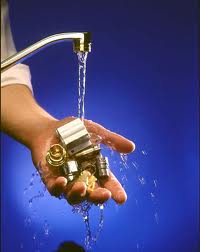Petroleum-based chemicals such as mineral spirits are frequently used to dissolve dirt, oil, burnt-on carbon, and grease quickly from the surfaces of parts or machinery. These traditional cleaners are a risky application because they pose significant harm to any individual handling them. Certain factors make petroleum-based organic solvents more dangerous than aqueous cleaners including:

- Volatile Organic Compounds (VOC’s)
- Hazardous Air Pollutants (HAP’s)
- Quick Evaporation
- Production of Hazardous Waste
- Toxic to Environment and Humans
Cleaners with harmful chemicals make exposure to hazards difficult to control thus resulting in increased costs. Petroleum-based cleaners create a large amount hazardous waste that must be disposed of properly to prevent environmental harm. Proper disposal is costly to any industrial facility frequently using organic solvents during product creation or cleaning processes. Considered as carcinogens, petroleum-based solvents or cleaners have been determined as contributors to several long-term, debilitating health conditions as a result of quick evaporation and emitted fumes. Aqueous cleaners offer an environmentally safe alternative to using cleaning agents containing an increased amount of VOC’s for completing essential industrial processes.
Water-Based Solutions Are an Effective Choice
An aqueous cleaner does not always meet cleaning or degreasing needs, but is capable of removing grease, oil, grime, or dirt in many scenarios. Unlike solvents, aqueous cleaners rely on heat and agitation to break contaminants down into smaller particles. The cleaning process is indeed different; however, agents consisting of water as a base perform just as well as petroleum-based solvents. Equipment used for processes involving aqueous cleaners is critical to the success of contaminant removal as it must apply the right amount of heat and force. It is important to remember that a selected cleaner should match the equipment being used. Processes such as filtering, oil skimming, proper maintenance, and the use of microfiltration for recycling purposes will also maximize the life of any aqueous cleaner. Water-based solutions offer companies several advantages over traditional cleaning choices including:
- Non-Flammable
- Little to No VOC’s and HAP’s
- Decreased Labor
- Reduced Waste
- Lower Operational Costs
- Limited Exposure to Hazards
- Fulfillment of Compliance Standards
- Environmentally Safe
Aqueous cleaners do not contain the hazards often found in petroleum-based solutions and this makes them safer to handle. Additionally, deciding to make the switch to using these products ensures workers are minimally exposed to dangerous chemicals, thus limiting resulting health conditions, time off work, and insurance costs. Aqueous cleaners are a high performance alternative to solvents containing a large amount of VOC’s. This decision will be more rewarding if an understanding of what products work best for larger volumes, heavy soil concentrations, and light cleaning requirements exists prior to purchasing. Contaminant removal needs must be matched with current or newly purchased equipment to obtain the best results. With the plethora of choices offered today, any company can switch to aqueous cleaners or another low VOC alternative to decrease costs and create a safer working environment.
Aqueous cleaners offer a safer alternative to using dangerous organic solvents for industrial cleaning processes and play a pivotal safety role in the workplace. For more information about environmentally friendly, low VOC products, please call (800) 886-8240 or email info@ecolink.com.














